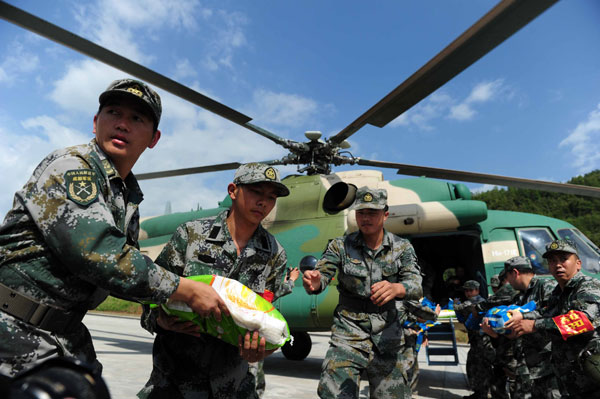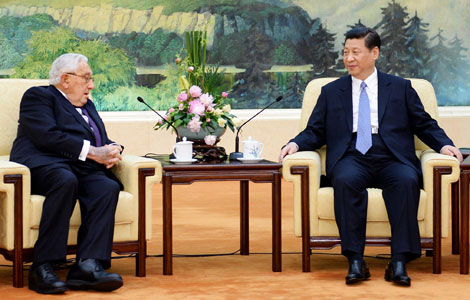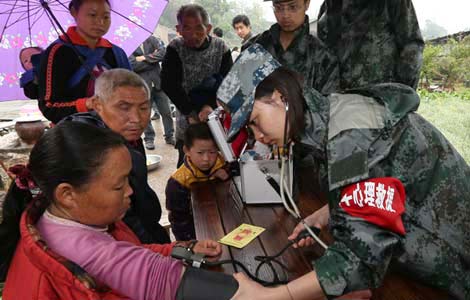
I didn't know how to react then; Now I do, says soldier
Collapsed houses and broken roads, devastated by Saturday's magnitude-7 earthquake in Lushan, Sichuan province, are all too familiar to soldier Zhu Yunping.
 |
|
Soldiers from the Chengdu Military Command Area load a bag of rice onto a helicopter heading to quake-hit areas in Lushan, Sichuan province, on Wednesday. GUO LILIANG / FOR CHINA DAILY |
He witnessed even worse damage five years ago in areas affected by the Wenchuan earthquake, which killed more than 69,000 people.
 Many soldiers helping with rescue efforts in Lushan have memories similar to Zhu's when it comes to earthquake rescue.
Many soldiers helping with rescue efforts in Lushan have memories similar to Zhu's when it comes to earthquake rescue.
Lang Anwu, chief of staff in a search-and-rescue regiment in the Chengdu Military Command Area, said, "The trucks in my regiment, which are equipped with rescue equipment, started heading for Longmen township 14 minutes after the quake on Saturday."
The troops arrived at Lushan county four hours later and reached Longmen after an arduous 30-minute trek.
As the first soldiers to reach the epicenter, they stopped to rescue the injured and helped retrieve food and beds from debris on the way to Longmen.
Zhu, a 30-year-old sergeant in the regiment, said his experience in searching for survivors in the Wenchuan quake in 2008 prepared him for the mission in Longmen.
A week after the Wenchuan disaster, Zhu and four other soldiers were assigned to search for a helicopter that went down in a valley in Lixian, a county ravaged by the quake. That search is etched in his mind, and now he is capable of tackling many challenges posed by earthquakes.
Five years ago, with just two bottles of water and an egg pie, the team started its hazardous journey. On the way to the highest mountaintop, which they thought was the best point to locate the wrecked helicopter, they experienced dozens of landslides and aftershocks.
"One aftershock rocked the hill, and I fell into a hole. Fortunately, my teammate held on to me," Zhu said. "One slip would have been fatal. At that time, I didn't know how to react. But now I am fully aware of the consequences and solutions."
Caution is always the best way to steer clear of danger, Zhu said, especially in earthquake zones. "People have to pay attention to all their surroundings to avoid dangers."
In situations where it is hard to gain access to buildings that have been destroyed, Zhu reminds his teammates to stay calm and spot an opening during aftershocks, while making sure it is safe to enter.
Calluses on his palms bear testimony to the work put in by the 11-year veteran.
In a muddy field 500 meters from the Longmen township government headquarters, the regiment struck camp. In a makeshift tent, using wooden plates as the floor and with one quilt for each soldier, Zhu instructed his 15 teammates on how to prevent potential danger to local residents' property from the debris. "Don't approach any falling walls and keep a close eye on the interior of damaged houses when moving property out," he said.
On Tuesday, Zhu and his team saved a Tibetan mastiff from a house where a wall collapsed, leaving the dog in a confined space, with a wooden board on its head proving to be the animal's last line of defense.
His experience five years ago in Lixian told him the dog could only be saved by removing debris on its left and right sides.
"The animal would have been killed if we moved the board from above," he said.
Among priorities for the soldiers, saving rice and other materials are regarded as the most important for local residents.
Ji Xu, political instructor to Zhu's regiment, said, "No matter what happens, the soldiers must go to the front line and shoulder the responsibilities to protect people's lives and property."
Related readings:
Live report: 7.0-magnitude quake hits Sichuan
Premier thanks nations for aid
Quake-hit region faces new threats
Expert calls for rational volunteering, donations
Photos: Search for lost valuables after quake
Preventing infectious diseases in quake-hit county
Quakes hit Yibin city, injuring 47
General aviation firms offer quake relief help








